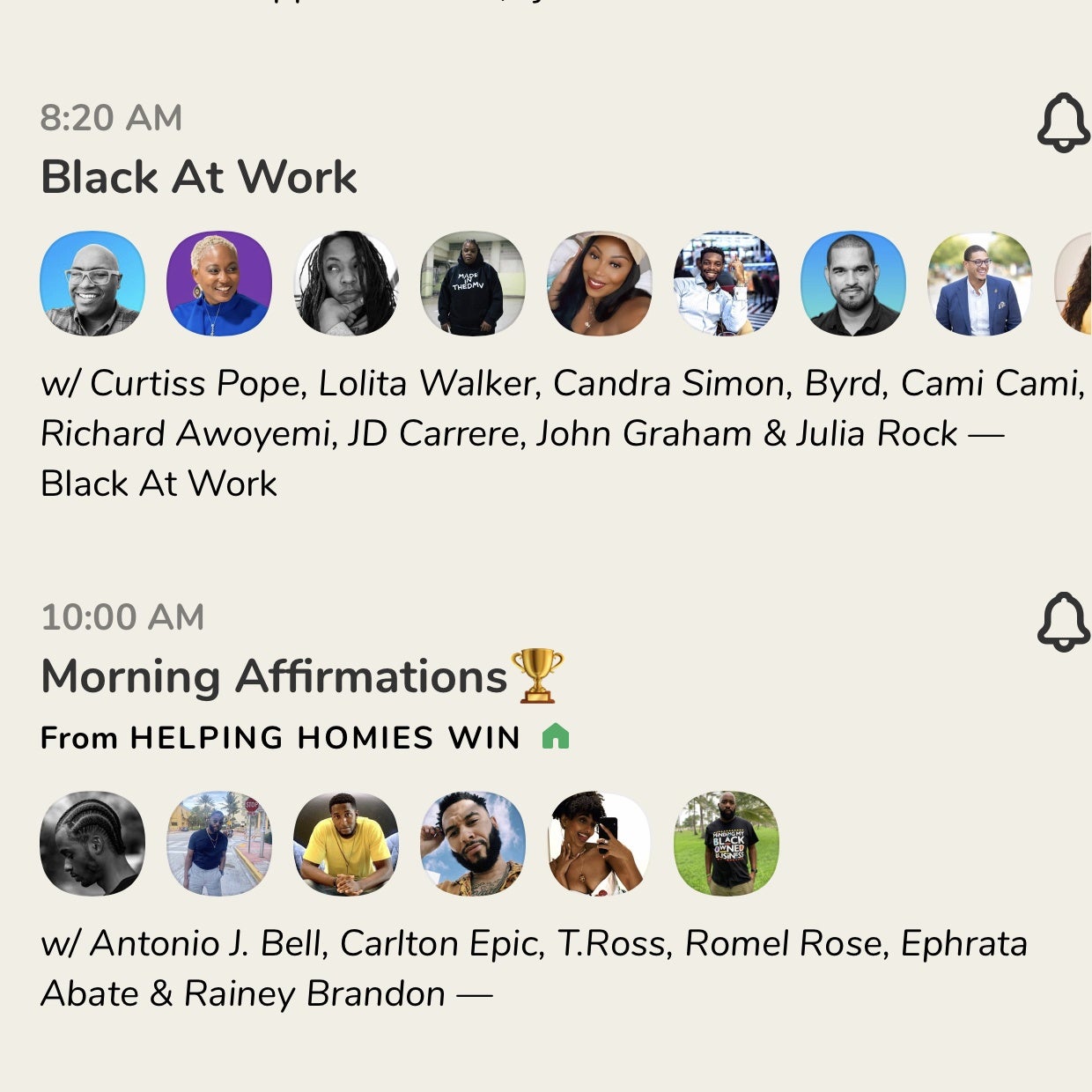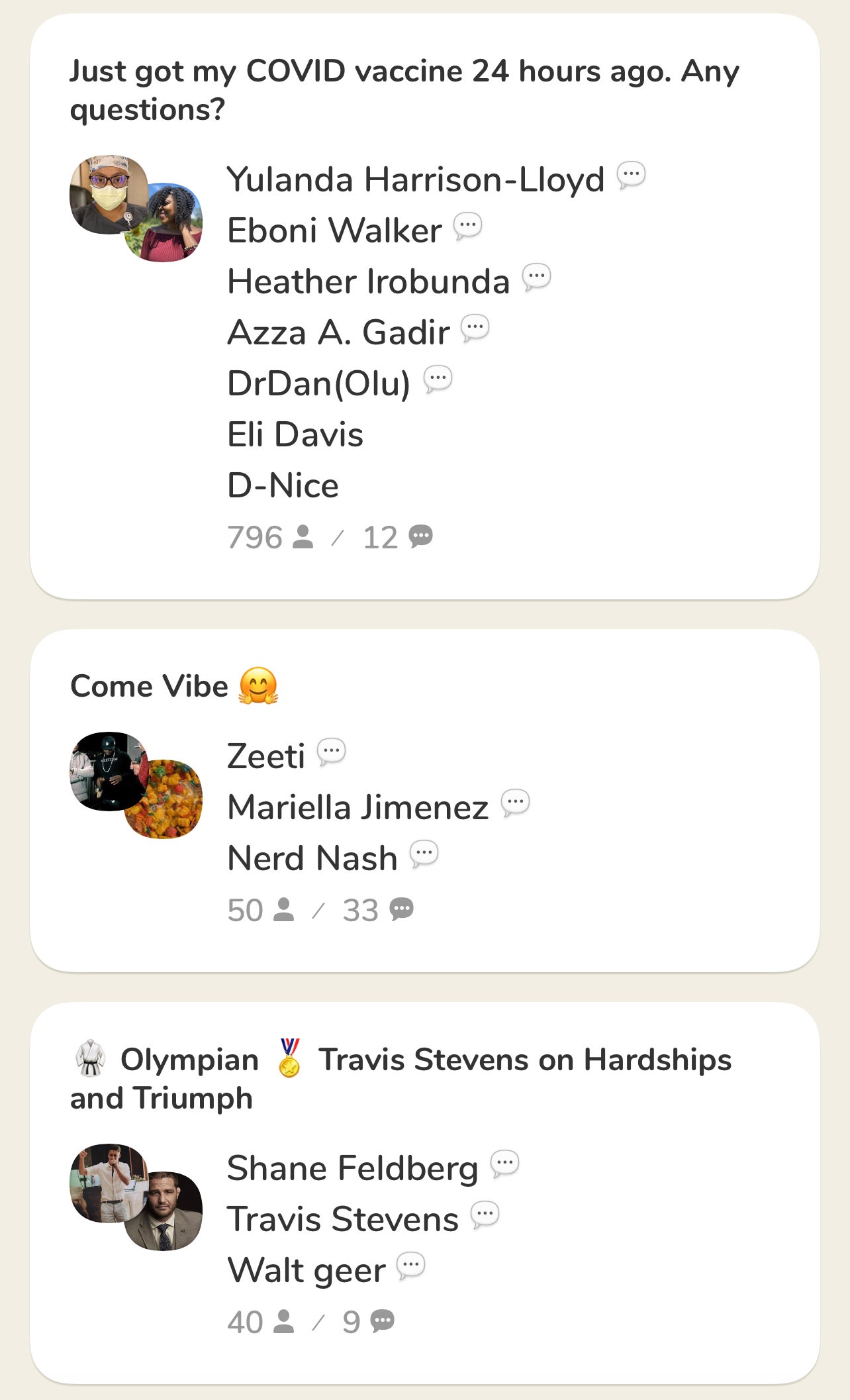
If you’re active on social media, in the last month or so, you’ve likely seen mentions of “Clubhouse” or “CH.” You may have had friends clue you in on the platform or figured it out yourself. Clubhouse is a drop in audio app—no text or video communication of any kind outside of your bio and images in your user avatar—that’s organized by “rooms,” or conversations, instead of by individual user content. Got it?
Users in each room are either on “stage” as a speaker/participant (meaning you can use your mic) or in the audience (you have to just be an engaged listener). Confusing? Imagine a conference based in a hotel, and you have large panel discussions in the ballrooms, mid-sized fireside chats or workshops that allow audience questions in smaller rooms, and intimate group discussions and convos in conference rooms. But you also might swing through a networking mixer, stop by a kickback in a friend’s room (or host one of your own), and hit a party. Convert that to a digital experience, and you have Clubhouse. The catch, however, is that its currently invite only (although the app is in the Apple store, and you can join the waiting list).
The question many are asking in light of recent high profile/high drama events going down on the app is, what exactly is Clubhouse for?

Conversations about it are often vague and limited in detail, which leaves people wondering; is it an exclusive app for the cool kids where people can feel self-important? Is it for celebrities and people who want to hang out with them? Is it a party app? Is it a genuine resource to learn more about what interests you, like say, how to invest or what to know when buying your first home? Is it a bunch of clout chasing? Is there opportunity to expand your brand? Is it entertaining? Is it just people who like to hear themselves talk? Is it a new iteration of the party lines we were all on in middle and high school back in the day? Yes. It’s all of that.
The bits of info from Clubhouse that do make their way to social media admittedly make it sound messy and insufferable: backlash about who’s been brought on the app, questions about whether it’s a “safe space” for Black people, accusations of capping and brown-nosing, celebrity “draggings” and drama, and confusion about why anyone would spend so much time on the platform except to try to be seen and heard.
But that’s a limited view.
I’ve been on the app since August, when there were only about 6K users and members were largely tech execs and founders, venture capitalists and some “thought leaders.” I was in one of the early waves of Black users to come on board; part of an intentional push from the app team to diversify the space. From week to week, as more of my people joined the app (mostly from entertainment and media initially) the space started changing in real time. There was a wider choice of conversations, creative uses of the rooms like live games or artist premieres, and more late night traffic as we all just sat in rooms talking about whatever. By late September, users were increasing rapidly and exponentially, and as Clubhouse has grown (the app reportedly just passed 100K users), usage continues to evolve in…creative ways (I’m looking at you, Moan Room).
The invite-only exclusivity has users and potential users scrutinizing Clubhouse possibly more than other social media platforms were examined in their early stages, and the live conversations and real time experience has made Black users, especially, more concerned about their IP as we do what we’ve done on every social media platform: create a robust subculture. In reality, Clubhouse is evolving like any other online community—for better and worse.

We’re just getting a closer look at the process than many of us had the opportunity to with other social media apps. Clubhouse will be opening wide to the public at some point in the near future (the invite only phase is part of Beta testing) but as you decide whether you want to hop in line to get in, consider this your Clubhouse Explainer to debunk and clarify some rumors you’ve already heard.
WHY DOES CLUBHOUSE SEEM MESSY?
The reason Clubhouse is both somewhat opaque to people not on the app and addictive to people on the app (there was a point in September when I was spending so many late nights on Clubhouse I completely changed my sleep rhythm) is because, unlike Instagram Live, there’s no playback; no transcript; no individual user feeds to hear/see content. If you missed something on Clubhouse in real time, you just missed it. The convos are one and done.
The positive thing about this for the Clubhouse team is that it creates FOMO, keeping users on the app and piques interest from people who want to get in the room. The positive thing as a user is that it encourages a level of active listening and engagement we don’t always exercise on social platforms (for example, you can’t be on a Clubhouse stage and watching TV at the same time). There’s also a (possibly false) sense of safety knowing the conversation is live only; you might be willing to share more than you would in a clip you know can be heard and shared widely and repeatedly.
The downside is that it leaves room for games of telephone; bits of detail and paraphrased quotes relayed without full context. A room can last for hours, and the convo evolves in multiple ways over the course of that time, plus rooms that spark controversy often prompt spin-off rooms to recap them, then spill over on social media, all with people sharing different perspectives of the same event/conversation. So when/if you hear about something on social media, it’s literally a game of he said/she said, with no way for anyone to go back and check the tape. Users who record and post room audio usually learn quickly that it’s against the Clubhouse Community guidelines—a suspension offense—because you’re recording people without their consent. Stories get quickly convoluted.
IT SEEMS LIKE FOLKS JUST SWEAT CELEBRITIES
In spaces where everybody’s VIP, nobody’s VIP. One of the draws of Clubhouse is meant to be its egalitarianism. All users are on board by virtue of access to an invite, there are no verified badges, no real hierarchy (aside from the ability to create levels of private rooms), and in theory, anyone can join a convo with anyone—be it a tech founder or VC, or artists, mega-producers, moguls and personalities. In theory.
There were celebrities on the app early with varying degrees of participation. Some would only come in rooms moderated by people they knew, or structured as a closed stage (meaning no one from the audience could raise their hand to join). Some would just pop in spaces that were about specific topics.
At the app’s current size, entertainers coming to the platform the first day can easily draw over a thousand people. Now, some users have realized that creating rooms about bold-faced names draws people into the conversation—and will possibly draw in the person in question. This was the case in a conversation about why Tory Lanez was brought on the platform. (Tyga, who brought Lanez on board, joined the convo to answer.) In a recent room titled “Is Kevin Hart Funny,” about Hart’s latest stand up special, No F*$ks Given, the comedian joined to clarify a joke about his teenage daughter. Celebs also chimed in to convos about them in a room about upcoming rapper Mulatto’s choice of stage name, and recently a room about why aspiring rapper and full white man Chet Hanks insists on speaking in patois and using “ni**a.”
Celebrities on stage in Clubhouse can go left, quickly. If it’s an open conversation that the celeb joined unexpectedly, the group often splits into two factions: Those who want to defer to the talent and treat them as almost a show guest, and those who want to use the opportunity to hold the person’s feet to the fire. Moderators aren’t always prepared to keep the room level, and things can quickly devolve, at which point people start hearing about it on Twitter.
The conversation in the Kevin Hart room got increasingly antagonistic, as much because of people on stage talking over and disagreeing with each other as Hart himself’s answers. People love salaciousness, so we listen in, even as we’re texting and Tweeting about why the convo is terrible. And as people see those Tweets, they join to listen, and before you know it, you have over 3000 people listening to Chet Hanks—in his normal voice —getting yelled at by non-Jamaicans for using patois. It’s a wild social experiment.
When entertainers themselves are the ones hosting the room, as artists like Meek Mill and 21 Savage regularly do, sometimes the artists and co-moderators (often their teams) don’t bring people they don’t know to the stage, and while it’s still dope to be able to hear famous people talk among each other and their friends casually, it’s not really the same when the convo feels gated. But it’s also still possible to end up on a stage with either of them, or Tiffany Haddish, or DJ D Nice, or JR Smith, or any number of folks. Just be cool about the proximity—no need to praise them or, as an overcorrect, be rude to them. That’ll make it weird. Treat them with the same respect and energy you’d treat another person you’re having a conversation with. Then you might actually build a rapport with them, and that’s the value of the platform.
ARE THEY CENSORING AND MARGINALIZING BLACK PEOPLE?
You may have heard/seen users talking about Clubhouse White Flight as the app grew, and there’ve been conversations on the platform both in individual rooms and in weekly town halls with the founders about, among other things, the value of Black users on the app.
Just like earlier this year, when Black creatives were changing the way people used Instagram Live, there are calls for Black people to create our own platform (one is in early testing now called The Cookout), instead of expecting to feel welcome and comfortable on an app that wasn’t necessarily created with us in mind.
Months ago, co-founder Rohan Seth said in a community town hall that Clubhouse would grow to be a “community of communities.” Folks tend to follow people and gravitate towards topics that are familiar, with people that are familiar, and are increasingly carving out their own parts of the app, much like we have Black Twitter, LGBTQ Twitter, South African Twitter, Tech Twitter, Media Twitter etc. But diversifying your experience isn’t impossible; it just requires intention. As with all things on the internet, there’s an algorithm at play.
There are also community guidelines shaped based on feedback and suggestions from both the weekly town halls and the app team listening in and joining in rooms. The problem is, people don’t read them. There’s being silenced, and there’s violating the conditions of the app. On Monday, rapper Mase hosted a room in support of DJ L, a Clubhouse user who’d been repeatedly reported and then suspended from the app for creating rooms with titles like “Did Popsmoke Get Himself Killed?” DJ L is among a group of users who’ve been accused of intentionally making rooms with incendiary names/topics to bring people in, create heated discussions on the stage, and go viral. After multiple rooms like this stirred up discord and drama, using someone’s name in a room topic if they aren’t actually in the room was added to the community guidelines as a violation.
Ultimately, the app is not a universal “safe space” for anybody, but as a user you do have an amount of control over the conversations you’re exposed to and participate in, and with whom.
I HEARD IT WAS AN APP TO MAKE MONEY
I saw a few tweets the other day which boiled down to (paraphrasing), “Y’all need to get over to Clubhouse and build your brand before the space is saturated,” and points were made. Over the years, we’ve seen creators utilize Vine, Instagram, Twitter and now TikTok in ways founders never imagined, turning users into influencers and even launching careers. Clubhouse is still new enough to create almost anything you can imagine on the platform. People host game nights (shout out to Black Jeopardy), weekly lounges (The Cotton Club was an early favorite), astrology readings, talent shows, there’s even a performance of The Lion King currently in development. It’s an excellent platform to tell your story, showcase your talents (especially if you’re a coach, host or speaker) and connect with and learn from others in your field. On any day, there are multiple rooms and conversations with industry leaders.
As mentioned earlier, the app was initially tech and VC folks, so there were pitch rooms, raise rooms and conversations that led to investments. That still exists, although it can be a little harder to find among the other programming. Most importantly, though, there’s nothing stopping anyone from creating their own room to talk about their upcoming launch or project that needs funding. Trying to get something new off the ground? Looking to increase your visibility? Clubhouse can be a great place for that. It’s also a good tool to practice for a pivot. Super-producer 9th Wonder talked to some fellow DJs and producers recently about teaching at universities (as he does in his native North Carolina at Duke), and when someone said they wouldn’t even know where to start, the reply came “use Clubhouse to start.”
SO WHAT’S THE BIG DEAL?
Clubhouse is a unique app because of the level connections and conversations you can foster – even now. But, it’s also primed for back and forths and grandstanding – as any app is, to be fair. How you use it is up to you. As I wrote this piece, I listened in on a room where users shared their reasons for coming on the app. One said it was to network, someone else said it was just as a social/party app, someone else said it was to make money. All valid reasons, if you’re intentional about using it the way you plan.
Some treat Clubhouse the same way they would a podcast or satellite radio network – as both talent and listeners. Speakers, coaches and facilitators are easily able to translate their work to regular programming that’s scheduled on the internal app calendar, with rotating guests and topics. I’ve had some rich learning experiences on Clubhouse, like listening to a room full of South African and West African entertainment execs and creators talk about the various music scenes on the Continent, and why the US still didn’t get it. And I’ve been in some rooms where unexpectedly, you hear some gems drop because of the people who ended up on stage, like one night around 2am when Pebbles started telling stories about her music, or Jay Z’s hours long Birthday celebration where Roc a Fella and Roc Nation rappers and colleagues, plus DJ’s, producers, radio personalities and other Jay affiliates shared never before heard stories.
And yes, there’s foolishness on Clubhouse – sometimes on purpose. Twitter topics have evolved into room discussions in the last few months; there was recently a day-long digital diaspora back-and-forth ignited over a tweet about an electric kettle, and 3000-plus people bore witness to a breakup in real time after a fly-out went wrong. But in recent days there’s also been a live watch of the Atlanta Senate debates, a room about how to elevate your sugar baby game, a welcome room introducing Bow Wow to the platform, poetry rooms, multiple convos about music from the creative, executive and fan perspective, meditation and therapy rooms, and rooms about stocks, investments and the luxury market.
IS IT WORTH IT?
In my opinion, it’s free and it has great value. But you’ll get out of it what you put into it. For example, if you’re hoping to grow your brand from the app, you need to think about what kind of discussions or rooms you can offer and how it’ll be unique. If you want to network, you can find your professional, organizational or metro-area tribe. If you just want to listen and learn, there’s no shortage of opportunity there; look through upcoming events and plug them into your calendar. If you want to do hoodrat ish with your friends and kiki, there are rooms for that, too!
It does require occasional breaks and unplugging. People talking to you directly, or even listening to multiple people talk to each other directly, is a different energy than watching two people chat on IG. It can drain you, and the occasional community drama can become exhausting/annoying. But hopefully, this helps as a navigation guide as you decide whether you’re going to accept the invite you’ve been sitting on and/or ask for one. I’d suggest getting in and finding your sweet spot before the app opens doors to general admission. Good luck.
